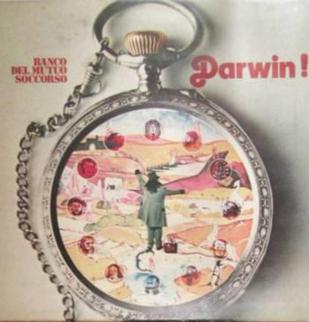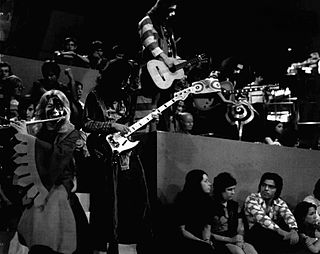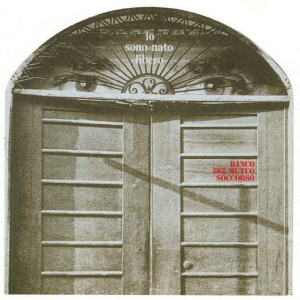Italian rock is a form of rock music produced primarily in Italy. The music genre has roots in the country as it spread in the early 1960s from the United States with the earliest versions of rock and roll during this period being cover versions or interpretative covers of already existing songs.

Museo Rosenbach are an Italian progressive rock band whose album Zarathustra, in spite of the limited success it scored in the 1970s, is today considered a cornerstone of the genre.

Premiata Forneria Marconi (PFM) is an Italian progressive rock band founded in 1970 which continues to the present day. They were the first Italian group to have success internationally. The group recorded five albums with English lyrics between 1973 and 1977. During this period they entered both the British and American charts. They also had several successful European and American tours, playing at the popular Reading Festival in England and on a very popular national television program in the United States.
Cervello ("Brain") is a band from Italy.

Banco del Mutuo Soccorso is an Italian rock band. A popular progressive rock band in the 1970s, they continued making music in the 1980s and 1990s. Recently, they were still active, playing live in 2001 and 2008 at NEARfest. Their charismatic frontman, Francesco Di Giacomo, died in 2014.

Le Orme is an Italian progressive rock band formed in 1966 in Marghera, a frazione of Venice. The band was one of the major groups of the Italian progressive rock scene in the 1970s. They are one of few Italian rock bands to have success outside their own country, having played concerts across North America and Europe, and releasing an album in English at the height of their success.

Darwin! is the second studio album by Banco del Mutuo Soccorso, released in 1972 on the Ricordi label. It is a concept album about the birth and the evolution of life on Earth.

...di terra is the seventh studio album by Italian progressive rock band Banco, released in 1978. It is an entirely instrumental work, recorded together with Orchestra dell'Unione Musicisti di Roma. The album's title is based on a poem of the same name by the band's vocalist Francesco Di Giacomo, with each song title a line from the poem.
Locanda delle Fate is an Italian progressive rock band from the end of the Italian progressive rock movement.
Raccomandata con Ricevuta di Ritorno, are an Italian progressive rock band.
Il Rovescio della Medaglia, or RDM, were an Italian hard rock and symphonic rock band. They are most famous for their symphonic rock piece Contaminazione, released in 1973. It contained four pieces from Bach's Well-tempered Clavier seamlessly integrated with RDM's own music, which often was inspired by rock or hard rock. In 1974 the record was released in an English version, Contamination, with the group's name simplified to RDM, although still written in full on the back of the LP jacket.

Osanna are an Italian progressive rock band.

Io sono nato libero is the third studio album by Italian progressive rock band Banco del Mutuo Soccorso. "Non mi rompete" and "La città sottile" were released as singles in 1973.

Come in un'ultima cena is the sixth studio album by Italian progressive rock band Banco del Mutuo Soccorso. The English version of the album was released with the title As in a Last Supper.

Banco del Mutuo Soccorso is the eponymous debut album by Italian progressive rock band Banco del Mutuo Soccorso. The cover of the original vinyl was shaped like a piggy bank; a slit was extracted from a strip of cardboard with the faces of the members of the group. The image on the cover is by illustrator Mimmo Mellino.

Banco is the fourth studio album by Italian progressive rock band Banco del Mutuo Soccorso. The album was originally released in 1975 on the Manticore Records label launched by Emerson, Lake & Palmer with whom the band shared a firm stylistic similarity.

Marco Castoldi, better known by his stage name Morgan, is an Italian singer and musician. His musical genres are mainly alternative rock and electronic rock, sometimes experimental rock and synth-pop. He has also been a judge for seven seasons in the Italian version of The X Factor, winning five of them through acts he mentored: Aram Quartet, Matteo Becucci, Marco Mengoni, Chiara Galiazzo and Michele Bravi.
Nova was an Italian progressive rock band that was formed in 1975 from members of the bands Osanna and Cervello. Based in London for most of their career, they released four albums that were influenced by the 1970s jazz fusion styles of bands such as Mahavishnu Orchestra, Weather Report, and Return to Forever.
Canto di primavera is the eighth studio album by the Italian progressive rock band, Banco del Mutuo Soccorso. the album was first released in 1979. the album marked the return to lyrical songs after the instrumental album, ...di terra. the album reached to No. 36 in the Italian album chart.
Paolo Romano Carta is an Italian musician, singer, guitarist, musical director and record producer.












